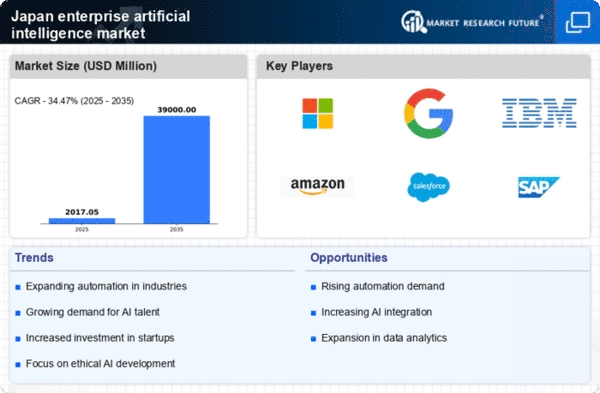Talent Shortage in AI Expertise
Despite the rapid growth of the enterprise artificial-intelligence market, Japan faces a significant challenge in the form of a talent shortage in AI expertise. The demand for skilled professionals in AI and machine learning far exceeds the available supply, which poses a barrier to the effective implementation of AI solutions. Companies are increasingly competing for a limited pool of talent, leading to rising salaries and recruitment costs. This shortage may hinder the pace of innovation and adoption of AI technologies across industries. As organizations seek to bridge this skills gap, investments in training and development programs are likely to increase, which could ultimately benefit the enterprise artificial-intelligence market.
Government Initiatives and Support
The Japanese government plays a pivotal role in fostering the enterprise artificial-intelligence market through various initiatives and funding programs. By investing in AI research and development, the government aims to position Japan as a leader in AI technology. Recent reports indicate that public funding for AI projects has increased significantly, with allocations reaching over ¥100 billion in the last fiscal year. This support not only encourages innovation but also attracts private sector investment, creating a conducive environment for the growth of the enterprise artificial-intelligence market. As government policies continue to evolve, they are likely to further stimulate advancements in AI applications across multiple industries.
Focus on Enhanced Customer Experience
In the competitive landscape of Japan, businesses are prioritizing enhanced customer experience through the implementation of AI technologies. The enterprise artificial-intelligence market is witnessing a shift as companies leverage AI to personalize services and improve customer interactions. By utilizing AI-driven chatbots and recommendation systems, organizations can provide tailored solutions that meet individual customer needs. Recent surveys indicate that companies investing in AI for customer engagement report a 20% increase in customer satisfaction rates. This focus on customer-centric strategies is likely to drive further investment in AI technologies, thereby contributing to the growth of the enterprise artificial-intelligence market.
Rising Demand for AI-Driven Solutions
The enterprise artificial intelligence market in Japan experiences a notable surge in demand for AI-driven solutions across various sectors. Industries such as manufacturing, finance, and healthcare are increasingly integrating AI technologies to enhance operational efficiency and decision-making processes. According to recent data, the market is projected to grow at a CAGR of approximately 30% over the next five years. This growth is fueled by the need for businesses to leverage data analytics and machine learning capabilities to remain competitive. As organizations recognize the potential of AI to streamline processes and reduce costs, the adoption of AI solutions is likely to accelerate, thereby driving the enterprise artificial-intelligence market forward.
Integration of AI with IoT Technologies
The convergence of artificial intelligence and Internet of Things (IoT) technologies is transforming the enterprise artificial-intelligence market in Japan. As IoT devices proliferate, the ability to analyze vast amounts of data in real-time becomes increasingly critical. This integration allows businesses to optimize operations, enhance customer experiences, and improve product offerings. For instance, in the manufacturing sector, AI-powered IoT solutions can predict equipment failures, thereby reducing downtime and maintenance costs. The market for AI and IoT integration is expected to grow substantially, with estimates suggesting a potential increase of 25% in the next few years, further propelling the enterprise artificial-intelligence market.
















